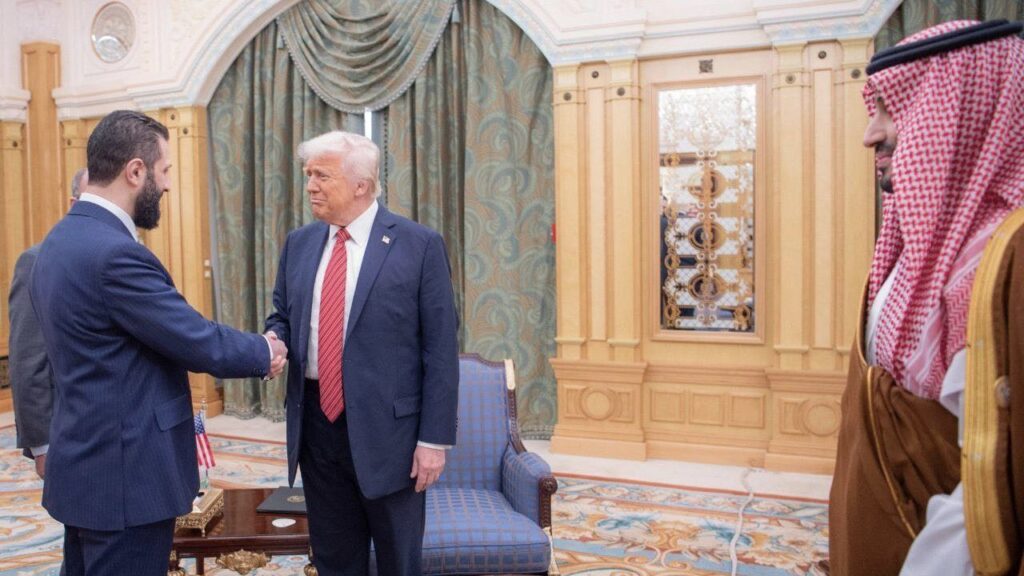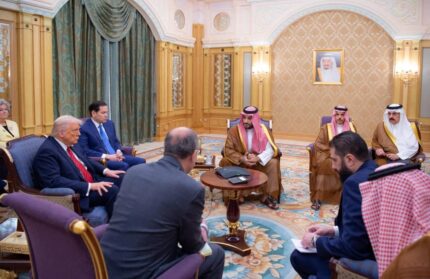President Donald Trump’s surprise declaration to lift all U.S. sanctions on Syria has brought a wave of relief to the country’s transitional government. Speaking at an investment forum in Riyadh, Saudi Arabia, on Tuesday, Trump declared, “I will be ordering the cessation of sanctions against Syria in order to give them a chance at greatness.” This move follows months of lobbying by Syria’s interim administration, led by President Ahmed al-Sharaa, who argued that sanctions had crippled the war-torn nation’s efforts to pay civil servants, rebuild cities, and restore essential services like healthcare.
The Syrian leadership has worked closely with allies like Turkey and Saudi Arabia to push for normalization. Riyadh, in particular, has offered to pay off parts of Syria’s debts and continues to provide reconstruction aid—activities that had previously risked violating U.S. sanctions. The Saudis see a strategic opening to align Syria more closely with their interests, moving the country away from Iran’s influence following the collapse of Bashar al-Assad’s regime in December.
Treasury Department Caught Off Guard by Trump announcement
Inside the U.S. Treasury Department, which oversees the enforcement of sanctions, Trump’s announcement caused immediate confusion and concern. According to sources cited by opitanglobamedia news, senior officials were not informed beforehand and were left scrambling to interpret the president Trump’s intentions. The speech offered few specifics, triggering internal discussions about how to implement the proposed rollback and what pace would be appropriate.
A Treasury spokesperson has yet to respond to inquiries, but officials acknowledged that some preliminary work had already begun on a phased easing of sanctions. These efforts had focused on easing the burden on Syria’s civilian population while maintaining pressure on any remnants of the Assad-era power structure. With Trump’s abrupt policy pivot, those plans may now accelerate—or be fundamentally rewritten.
State Department Confirms Prior Discussions, But Questions Remain

Secretary of State Marco Rubio, speaking at a NATO foreign ministers’ meeting, confirmed he was present when Trump made the decision to include the sanctions relief in his Riyadh remarks. “This is something that had been discussed, worked on, options considered for many weeks leading up to this announcement,” State Department deputy spokesperson Tommy Pigott said Thursday.
Pigott insisted that the administration is now focused on executing the president Trump’s directive. However, he did not clarify whether the plan would involve full repeal of longstanding sanctions or a limited rollout of waivers. Rubio suggested the first steps may include waivers under the Caesar Act that would allow allies to deliver aid and conduct limited business without fear of penalties, paving the way for broader legislative action to lift remaining sanctions.
Historical Background: Decades of U.S. Sanctions on Syria
U.S. sanctions on Syria date back to 1979 and have been reinforced over successive administrations. In 2003, President George W. Bush signed the Syria Accountability Act, citing the country’s support for Hezbollah, alleged weapons development, and interference in Iraq. The sanctions intensified under President Barack Obama, particularly after the outbreak of the Syrian civil war in 2011, which left over 500,000 people dead and millions displaced.
The most severe sanctions came during Trump’s first term with the 2019 Caesar Syria Civilian Protection Act, designed to punish the Assad regime for war crimes and human rights violations. This act not only penalized Syrian officials but also foreign businesses and governments that cooperated with them, severely restricting Syria’s access to global markets and financial systems.
Geopolitical Implications and Next Steps
Trump’s announcement marks a dramatic shift in U.S. policy that could realign Middle East dynamics. Regional allies like Saudi Arabia and Turkey are likely to welcome the decision, as it clears the way for more open engagement with Syria’s transitional government. Both nations had long argued that continued sanctions only pushed Syria further into economic collapse and dependency on Iran.
However, critics warn that lifting sanctions without clear benchmarks or oversight could embolden authoritarian tendencies or enable the resurgence of former regime loyalists. The international community will be closely watching how the administration rolls out the changes, and whether Congress will be asked to amend or repeal key legislative sanctions.
As Treasury and State officials work behind the scenes to implement the president’s directive, the world waits to see if this bold policy shift leads to meaningful recovery for Syria—or opens new geopolitical fault lines in an already fragile region.














